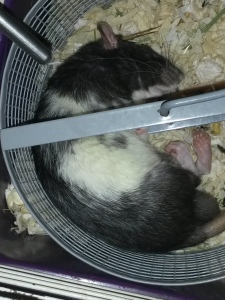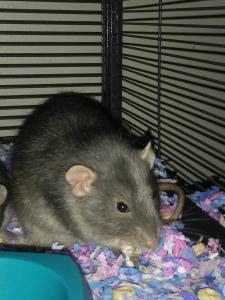Pet Rat Lifespan
Lifespans of Fancy Rats
 The common pet rat won’t be as long lived as many of our favorite pet species, including dogs and cats. This can deter excited new owners during the research process, as it is shocking to realize that pet rats will only live for 2-3 years on average; with even the best breeding lines making very marginal dents in lifespan. Usually, they live for 2.5 years, or 30 months. Yes, THIRTY months. That’s a really short lifespan for small pets like rats, as amazing of pets as they are. How long CAN a rat live? Well, there are several owners out there who may attest to having a rat live for 5 years. Is it really likely? No. But it is very, very possible with the right care when the rat has hit the healthy genetics lottery!
The common pet rat won’t be as long lived as many of our favorite pet species, including dogs and cats. This can deter excited new owners during the research process, as it is shocking to realize that pet rats will only live for 2-3 years on average; with even the best breeding lines making very marginal dents in lifespan. Usually, they live for 2.5 years, or 30 months. Yes, THIRTY months. That’s a really short lifespan for small pets like rats, as amazing of pets as they are. How long CAN a rat live? Well, there are several owners out there who may attest to having a rat live for 5 years. Is it really likely? No. But it is very, very possible with the right care when the rat has hit the healthy genetics lottery!
Lifespan Records of Pet Rats: How Old Was the Oldest Pet Rat That Ever Lived?
 Currently, there is a jaw dropping record for the longest lived pet fancy rat in history, that dates to 1995. A laboratory rat who was named Rodney lived to the ripe old age of 7 years and 4 months; is that unbelieveable or what?? He almost tripled his expected lifespan! I have met several owners and breeders of rats who have mentioned having their wonderful rats live to be 3 to 5 years old; this widely varies, but just like humans, there will be certain ones who long outlive their expected lifespan.
Currently, there is a jaw dropping record for the longest lived pet fancy rat in history, that dates to 1995. A laboratory rat who was named Rodney lived to the ripe old age of 7 years and 4 months; is that unbelieveable or what?? He almost tripled his expected lifespan! I have met several owners and breeders of rats who have mentioned having their wonderful rats live to be 3 to 5 years old; this widely varies, but just like humans, there will be certain ones who long outlive their expected lifespan.
How Can I Try to Make My Pet Rat Live Longer?
If you want your fancy rat to live a long and happy life, you will need to care for your rat very well. This means having a nice large cage with plenty of space instead of cramped and poorly ventilated cages, so that the rat may exercise and put its body to use. Never let your rats become too skinny or overweight, especially overweight. The excess weight will put strain onto the rat’s circulatory system, respiratory system, and joints (as well as much more). The rat should not be overbred, nor should it live in a dirty environment. Dirty and unkempt rat cages or bedding will expose the rat to illnesses, pathogens, and contaminants that could make it sick.
The diet will play a huge role in the rat’s lifespan, and you will need to feed the rat an organic, all natural, nutritionally complete diet. No preservatives or additives. While feeding foods like Oxbow are highly recommended, it still isn’t a natural diet. Natural diets will be expensive and demanding of time; you have to ensure that the rat gets nutrition from all sorts of food groups. From proteins and fats to vitamins and carbohydrates, rats’ dietary needs are similar to ours. Sticking with the Oxbow is probably still your BEST bet, as balancing those nutritional requirements might prove to be nearly impossible by yourself.
Breeding & Genetics: How It Affects Rat Longevity, or Lifespan

As rats are bred, genetic material is passed down. Those rattie genetics determine how healthy a rat will be and how susceptible they will be to disorders and diseases later in life.
Lifespan is always going to be related to the rat’s genetic makeup. Deep within the rat’s genotype, in its DNA, there will be markers for different diseases, genetic mutations, disorders, and even personalities. Rats might be bred in commercial barns where they breed as soon as they become able to, or they might be bred by personal hobbyists (or professional ratteries or breeders) who are specifically breeding rats from lines that have proven longer lifespans and fewer incidences of illness or disease.


